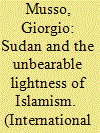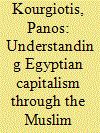| Srl | Item |
| 1 |
ID:
095106


|
|
|
| 2 |
ID:
157504


|
|
|
|
|
| Summary/Abstract |
The regime ruling Sudan since 1989 represents a pioneering experiment in the field of Islamist politics, being the first case in which a movement affiliated with the Muslim Brotherhood managed to conquer power and hold on to it for a considerable time. During the late 1990s, internal and external pressures threatened the survival of the regime, leading the ruling class to abandon its ambition to represent a model of revolutionary Islamic governance. Oil exports provided a catalyst for this pragmatic shift, intensifying patronage-based relations at the expense of ideological affiliation. Seen from a political economy perspective, the Sudanese experience proves the flexibility of Islamism as an ideology, but also its failure as a political practice to constitute a real alternative to the authoritarian dynamics that are widespread in the MENA region.
|
|
|
|
|
|
|
|
|
|
|
|
|
|
|
|
| 3 |
ID:
160045


|
|
|
|
|
| Summary/Abstract |
The following article addresses the intricate issue of contemporary Islamist thought’s relation to the modern capitalist economy, with special reference to the Egyptian case. Islamist thinkers have been vigorously proclaiming for the past decades that the economic prosperity of some Muslim nations stems from the proper adoption of an ‘Islamic economy’, whereas the absence of such a model has been mainly responsible for the crises that other nations faced. At the same time, we witness that the Muslim nations are fully integrated into the global market system. Although their rulers boast about achieving social justice, by economically interpreting Islam, nonetheless poverty and horrific injustices are officially retained and morally accepted, thus, enabling the upper classes to keep performing their pious duties in the name of God. In this regard, it seems that capitalism and piety are intertwined: the first justifies the necessity of the second, while the second humanizes the brutal impact of the first. By referring to the historical example of the Muslim Brothers in pre-socialist Egypt, the article tends to show under which circumstances was capitalism’s relation to religious piety conceptualized in Islamist thought and literature, in addition to the main social, organizational and ideological outcomes of this conceptualization.
|
|
|
|
|
|
|
|
|
|
|
|
|
|
|
|